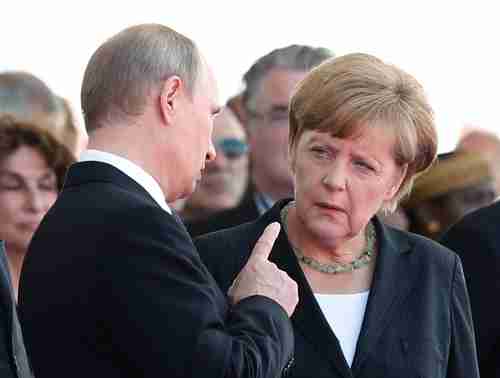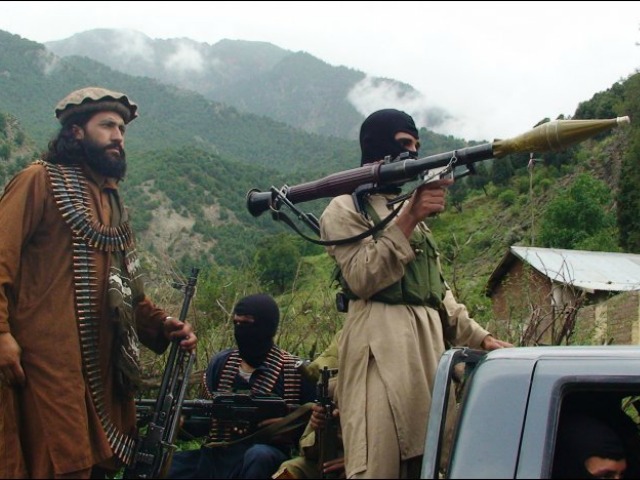
This morning’s key headlines from GenerationalDynamics.com
- Germany’s friendly relations with Russia turn hostile
- More Pakistan jihadist groups swear allegiance to ISIS
- Japan in shock as economy plunges into recession
Germany’s friendly relations with Russia turn hostile

Putin wags his finger at Merkel at the 70th anniversary of D-Day commemoration in June (Reuters)
Russia’s president Vladimir Putin has long had a soft spot forGermany, even developing a love for the German languagewhen he was stationed in the East German city of Dresdenas an office of the KGB in the late 1980s.
For her part, Germany’s Chancellor Angela Merkel has always promotedgood relations with Russia, and for solving problems with dialogue.The business lobby in Germany is both more powerful and moresympathetic toward Russia than any major European state, and theGerman electorate has generally favored a neutral stance on foreignpolicy.
But that’s changed dramatically in the last few months. Thanks toRussia’s invasion of Ukraine, annexation of Crimea, and the Russians’shooting down of airline flight MH17, Putin’s reputation among theGerman public has been plummeting. In a nationwide survey conductedin August, a German pollster reportedly found that 82% of Germans donot believe that Russia can be trusted, while 70% called for toughersanctions against the Russian economy.
Over the weekend, Merkel said, “Truly, the Ukraine crisis is in no waya regional issue. It affects all of us.” She said that she wasparticularly concerned that Russia would not stop with the invasion ofUkraine, but would go to the Balkans.
She warned that the EU will not yield to Moscow like East Germany oncedid:
Otherwise, one would have to say: We are too weak, becareful, we can’t accept any others, we have to first ask Moscowif it is possible. That’s how things were for 40 years; I neverreally wanted to return to that situation.
And that doesn’t just apply to Ukraine. It applies to Moldova, itapplies to Georgia. If the situation continues … we’d have toask about Serbia, we’d have to ask about the western Balkancountries. […]
After the horrors of two world wars and the end of the Cold War,[the Ukraine crisis] has challenged the peaceful order inEurope.
With the loss of Merkel as an ally, Russia is now almost completelyestranged from Europe and the West, and further confrontations aresure to follow. Der Spiegel and Time andEurope Online
More Pakistan jihadist groups swear allegiance to ISIS
The black ISIS flag is beginning to appear all across Pakistan,from the south of Punjab province north to Islamabad, and inBalochistan and in the Afghan-Pakistan tribal region. At least330 Pakistani terrorists are already known to be fighting alongsideISIS in Syria and Iraq.
ISIS has been recruiting heavily in Pakistan and Afghanistan,anticipating a gain of territory as American military forces withdraw.After meeting a three-man delegation from ISIS, the Jundullahterrorist group pledged allegiance to ISIS last week.Lashkar-e-Jhangvi is also considering allegiance. What these twogroups have in common is that they’re committed to exterminating ShiaMuslims wherever possible, and have committed numerous bombings ofmosques and marketplaces in Balochistan and Iran to accomplish this.Analysts say that so far IS has mainly attracted sectarian (anti-Shia)groups rather than anti-state militants like the Taliban.
In response, al-Qaeda has announced a new umbrella organization,Al-Qaeda in the Indian Subcontinent (AQIS) that has made deep inroadsinto Pakistan. On September 3, 2014, al Qaeda leader Aymanal-Zawahiri, in a 55-minute video posted on the Internet, announcedthe launch of AQIS to spread Islamic rule and “raise the flag ofjihad” across the Indian subcontinent, including Pakistan. South Asia Terrorism Portal (SATP – India) and Reuters
Japan in shock as economy plunges into recession
Economists were expecting Japan’s economy to grow by 2% in the third(most current) quarter, after having plunged a historic 7.6% in thesecond quarter. Instead, the GDP fell an additional 1.6% in the thirdquarter. And since the GDP has now fallen for two months in a row,Japan’s economy is officially in a recession. The fall into recessionis being blamed on a sales tax increase from 5% to 8% in April, whichcaused consumers to stop spending.
Japan’s prime minister Shinzo Abe will put any further planned taxincreases on hold, and will dissolve the Lower House and hold a “snapelection” in December.
Japan’s economy has been in a deflationary spiral since the early1990s, following a huge real estate and stock market bubble inthe 1980s, and a huge crash that began in January 1990. In thespring of 2013, Shinzo Abe launched something called “Abenomics,”involving a huge quantitative easing program. Japan’scentral bank “printed” hundreds of billions of dollars and usedit to buy bonds. This is similar to America’s recent quantitativeeasing program which, at its peak, put $85 billion per month intothe banking system.
The objective of Abenomics was to end deflation once and for all.But instead of stimulating spending, all the money just poured intothe stock market, benefiting only a minority of rich people. Thevast majority of Japanese people have incomes that are stagnantor falling.
This has also been a criticism of America’s quantitative easingprogram. In the U.S., the median income has been falling, but thestock market has been pushed up into bubble levels, with the S&PPrice/Earnings ratio (stock valuations) close to 19, an astronomicallyhigh level, much higher than the historical average of 14. Asahi Shimbun (Tokyo) and BBC
KEYS: Generational Dynamics, Russia, Vladimir Putin, Germany, Angela Merkel,Ukraine, Crimea, MH17, Balkans, Moldova, Georgia, Serbia,Islamic State / of Iraq and Syria/Sham/the Levant, IS, ISIS, ISIL,Lashkar-e-Jhangvi, Afghanistan, Iran, Jundullah, Balochistan,Al-Qaeda in the Indian Subcontinent, AQIS, Ayman al-Zawahiri,Japan, Shinzo Abe
Permanent web link to this article
Receive daily World View columns by e-mail

COMMENTS
Please let us know if you're having issues with commenting.